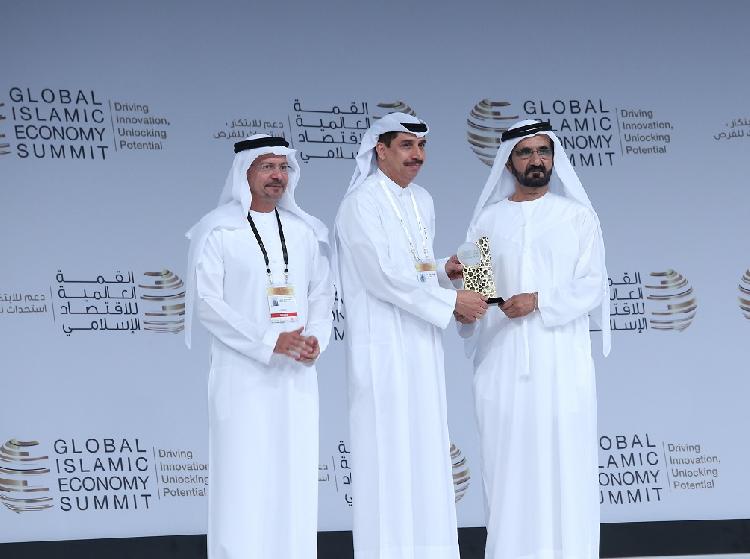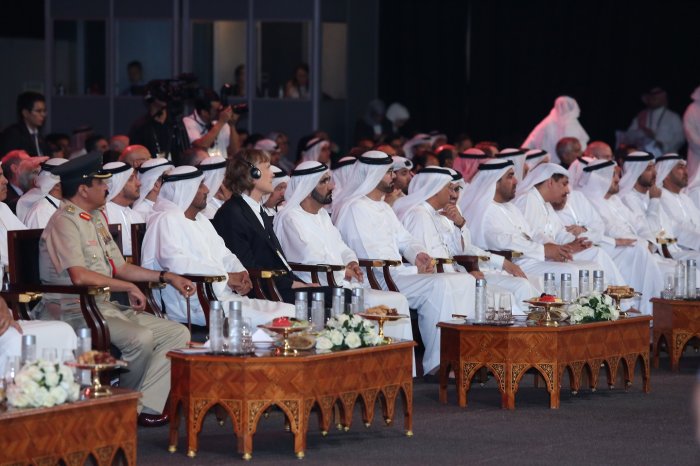
Global Islamic Economy Summit 2015 convenes in Dubai
His Highness Sheikh Mohammed bin Rashid Al Maktoum, Vice President and Prime Minister of the UAE and Ruler of Dubai inaugurated the second edition of the Global Islamic Economy Summit (GIES) in Dubai today. Over 2000 policymakers, thinkers and business leaders gathered to take part in the two-day summit hosted by the Dubai Chamber, the Dubai Islamic Economy Development Centre (DIEDC), and Thomson Reuters.
In efforts to continue facilitating the growth and development of the Islamic Economy, His Highness Sheikh Mohammed also officially inaugurated ‘Salaam Gateway,’ the first and only online platform for all Islamic economy-related industry intelligence, news, information, and data. Insights and intelligence, in both Arabic and English, are provided by Islamic economy experts, analysts, and industry and thought leaders. The platform was designed by DIEDC and Thomson Reuters as a business-to-business tool for the increasingly Shariah-sensitive Muslim professional, providing a comprehensive knowledge resource on all sectors of the Islamic economy. It is also the repository of an extensive database of Islamic Economy companies from across the globe.
Following on from the past edition of the Summit and last year’s roundtables, the Islamic Economy Awards, under the guidance of His Highness Sheikh Hamdan Bin Mohammed bin Rashid Al Maktoum, took centre stage at the Summit today. The awards, presented by His Highness Sheikh Mohammed bin Rashid Al Maktoum, recognise initiatives and ideas pertaining to eight key categories that have served to enhance bilateral trade and investment relations between Islamic nations.
The winners of the awards were: Dubai International Financial Centre for Money & Finance; Chemical Company of Malaysia Berhad for Food & Health; Unity Productions Foundation for Media; Hajjnet for Hospitality & Tourism; Center for Zakat Management for Waqf & Endowments; Affinis Labs for SME Development; Amanie Advisors LLC for Islamic Economy Knowledge Infrastructure; and Gould for Islamic Arts. Additionally, the ‘Lifetime Achievement Award’ was presented to Iqbal Khan, founder and CEO of Fajr Capital, for outstanding contributions to the Islamic economy.
H.E. Majid Saif Al Ghurair, Chairman of Dubai Chamber of Commerce and Industry, opened the awards ceremony with a keynote speech. He highlighted that the Global Islamic Economy Summit reflects the emirate’s concerted efforts in turning Dubai into a global Capital of Islamic Economy while providing an ideal platform for networking and exchange of experiences in encompassing a broader consumer base, standardization and identification of core challenges affecting the various segments of the Islamic economy.
H.E. Al Ghurair pointed out that the Islamic economy is a way of life experienced by over 1.6 billion Muslims around the world and its model cuts across all aspects of economic and social lifestyle of individuals and communities. This model has proved its excellence during the global financial crisis, making it a perfect choice for Muslims and non-Muslims alike.
His Excellency Sami Al Qamzi, Director General of the Department of Economic Development, Dubai, and Deputy CEO of DIEDC, said in a speech, “Dubai has moved in just a few years from a research and preparation phase to one of global engagement with the Islamic economy, represented by its numerous ethically-based sectors. From Halal products to Islamic banking and finance, this economy now represents a number of sectors that are receiving worldwide recognition and increasing demand.
“This rapid growth in the Islamic economy, both quantitatively and qualitatively, is evidence of a wise vision, precise timing, and a scientific approach. There is undoubtedly a great deal of work and effort remaining ahead of us, which we will approach with faith, knowledge and determination, guided by the experience we have acquired over the past few years.”
His Excellency Al Qamzi added, “Today, we look forward to global standards for Islamic products and services, and the provision of a stable and effective framework for the Islamic economy governed by appropriate legislative and regulatory organisations, and supported by studies, research, scientific knowledge and innovation. This pace of development will help meet the constantly evolving needs of markets, allowing this initiative to become a truly independent economy in and of itself, rather than merely being a subset of the broader global economy.”
The Summit began with welcome remarks from Abdulla Al Awar, CEO of DIEDC, followed by a keynote address by H.E. Mubarak Rashid Al Mansoori, Governor, Central Bank of UAE, who highlighted that UAE is globally recognised for having one of the healthiest Islamic ecosystems, and attributed the success to the UAE’s banking industry and the Central Bank’s role in continually strengthening the regulatory framework to ensure alignment with the Basel Committee for Banking Supervision (BCBS) recommendations and international best practice.
The plenary session of the day featured a vigorous debate amongst CEOs of Abu Dhabi Islamic Bank, Dubai Islamic Bank, Emirates Islamic Bank, and Kuwait Finance House, on the relevance of Islamic Finance to other sectors within the Islamic economy. The session, moderated by Axel Threlfall, Editor-at-Large at Reuters, UK, saw Tirad Al Mahmood, Dr Adnan Chilwan, Jamal Bin Ghalaita, and Mazin Al-Nahedh offer perspectives from a range of stakeholders in the Islamic finance industry and present their case on how they believe Islamic finance can engage with the Islamic economy.
Nobel Laureate and Founder of Grameen Bank in Bangladesh, Professor Muhammad Yunus, was the special guest of a conversation with CNN’s Middle East correspondent, John Defterios, on the power of social businesses. Before sharing his journey of Grameen Bank and the conception of microfinance, Professor Yunus took a moment to thank the organisers, and said: “This is important for me because I come from a long drawn struggle trying to persuade banks to extend their services to the people who are underserved.”
He explained how Grameen Bank revolutionised what was earlier being done by NGOs – they created, instead, a self-sustaining model of capital to invest in business ideas of poor people, worked with them to make them successful and enabled them to return the initial investment in order to “plough back” in to the bank, in to the next poor person. He stressed that the spirit of entrepreneurship is an innate human quality.
To the question of harnessing talent within the Islamic economy, Professor Yunus said: “The only answer is to create a new institution to serve the people that are underserved or never served”, and added: “There needs to be an independent regulatory authority for microfinance in every country – pan-regional legislation will not work, it will only serve to encourage countries to start thinking about the poor and recognise that banking can be a solution to human problems.”
Another keynote, the session led by H.E. Essa Kazim, Governor of DIFC, Secretary General and Board Member of Dubai Islamic Economy Development Centre (DIEDC), and H.E. Ambassador Hameed Opeloyeru, Assistant Secretary General for Economic Affairs of the Organisation for Islamic Cooperation, discussed ways in which the Saudi and UAE economies have successfully capitalised on the opportunities within the Islamic economy and achieved significant growth. During the discourse, they highlighted the impact on exports, inward investment, SME development, urban employment and rural agricultural development, offering guidance to policymakers in the audience on assessing strengths and weaknesses within the evolving parameters of the Islamic economy.
The Chairman of Dubai Chamber added that under the wise vision of H.H. Sheikh Mohammed bin Rashid Al Maktoum, UAE Vice-President and Prime Minister and Ruler of Dubai to consolidate Dubai's status as the Capital of Islamic economy has culminated in the emirate occupying the first rank globally in the issuance of Islamic Sukuk. He said, "With 57 speakers, 16 panel discussions and 4,000 participants from around the world, the Summit highlights the potential of Dubai in the area of Islamic economy while emphasising its commitment to making the emirate a global Capital of Islamic economy.”
Nadim Najjar, Managing Director Middle East and North Africa, Thomson Reuters, added: “Today’s discussions have led to interesting outcomes, inciting a great degree of interest in the audience amongst whom were policymakers and business owners looking for clear direction on capitalizing on the opportunities. We are pleased to see GIES evolve into a breeding ground for ideas and a platform for meaningful discourse and learning.”
The inaugural edition of GIES took place in 2013 and was jointly hosted by Thomson Reuters and the Dubai Chamber.
For further details about the conference programme visit http://giesummit.com/en/gie-summit/ or search the hashtag [#GIES] for live updates on Twitter.
Salaam – The Global Islamic Economy Gateway can be accessed from www.salaamgateway.com and constitutes of seven pillar sites. Salaam Gateway users will be able to navigate easily from one pillar to another, and view an Arabic version of the digital portal. The seven pillars covered include Food; Fashion, Art and Design; Media and Recreation; Islamic Finance, Pharmaceuticals and Cosmetics; Travel and the Digital Economy.




























